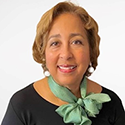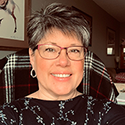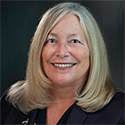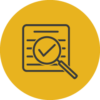
AGB’s Board Professional Certificate Program, launched in July 2022, was created by board professionals for board professionals. In this episode, Patti Kunkle, AGB’s senior vice president and chief membership experience officer, speaks with AGB Senior Consultant and Senior Fellow Lynnette Heard and Kent State University Vice President and University Secretary Charlene Reed, program task force members. They discuss why AGB created the program, the anticipated learner outcomes, and recommended additional professional development opportunities for board professionals.
Aired: July 31, 2023
Opinions expressed in AGB podcasts are those of the speakers and not necessarily those of the organizations that employ them or of AGB.
Podcast Transcript
Introduction:
Welcome to the Trusteeship Podcast from AGB, the Association of Governing Boards of Universities and Colleges. We cover everything higher education leaders need to know about the challenges facing our nation’s colleges and universities. More important, we provide the facts and insight you need to solve those challenges and to be the storytellers and advocates higher education needs.
Today, we’re talking about the Board Professional Certificate Program™, created by board professionals for board professionals.
In this podcast, Patti Kunkle, AGB Senior Vice President and Chief Membership Experience Officer, speaks with fellow program task force members, AGB Senior Consultant and Senior Fellow Lynnette Heard and Kent State University Vice President and University Secretary Charlene Reed, about why AGB created the program, anticipated learner outcomes, and additional professional development opportunities for board professionals.
Patti Kunkle:
Hello, I’m Patti Kunkle, AGB’S Vice President for Membership Experience, and I am thrilled to talk today with Char Reed and Lynnette Heard, two members of the AGB Task Force that built the Board Professional Certificate Program, which was launched on July 1st, 2022. AGB developed this program in recognition of how board professionals’ expertise and knowledge are essential for consequential boards to achieve excellence.
Effective strategic governing boards are more engaged than ever before, and this level of engagement requires greater leadership and support from executive staff. Lynette, what do you see as the unmet need for professional development for board professionals that led to AGB creating the Board Professional Certificate Program?
Lynnette Heard:
Patti, that’s a great question. When I think back upon the many years board professionals have gathered I’d say even back 20, 30 years ago, we as board professionals began wondering, how can we enrich our knowledge? How can we advance our position within higher education and be of greater value to our institutions, to our president, to our president’s cabinets, to our boards, to others throughout the institutions we serve?
It was important for us particularly because as governing board primary liaisons and planners, we saw ourselves as unique and critical in the role of higher education. In this work that is often under the radar and also a part of a trusted confidante circle that the board and the president rely upon, we knew that board governance and the knowledge that we needed to maintain and gain was so important, but there was nowhere to find it.
Because consequential boards rely upon the knowledge and expertise of their board professional, we felt it was so important to begin building a program, and AGB is so powerful in the work of board professionals then who better to develop such a program as AGB? This exclusive certificate program offers a deep dive for board professionals who want to take the next step in enriching their own learning and support their institutions.
Patti, creating this program was a part of AGB’s intentional effort to elevate the board professional role and demonstrate how crucial and critical exemplary and consequential board governance truly is. And while we’ve seen board professionals obtain their degrees, either while they’re working or before they began in the role, there’s no formal education for this work known as a board professional. Many board professionals hold either associate, bachelor’s, master’s or terminal degrees.
There is still no formal education offered, nor preparatory training for those who serve in these roles. Our board certificate program is designed to introduce the basics of the profession and to help board professionals further develop and succeed in their career.
Patti Kunkle:
Char, anything you would like to add?
Charlene Reed:
Yeah, thanks, Lynette. I would build on that a little bit in talking about how this is really a program for board professionals created by board professionals and really emphasize that AGB has so many great resources that we all use every day, but what we’ve done with this certificate program is really take those and we selected 10 topics that we felt were most important. These are very complicated jobs with many requirements.
But taking those resources and developing in it into content that is really from the perspective of the board professional, because our role to play in many of these issues is very different than president or board chair or board members. That’s one of the things that I found exciting about it was really being able to cater this to the role exactly of the board professional.
Patti Kunkle:
Thank you. Char Reed literally wrote the book on this job, The Role of the Board Professional. Char’s book is a required reading before starting the certificate program. Char, how have you seen the role of the board professional evolve over the course of your career?
Charlene Reed:
Thanks, Patti. I loved the opportunity to write this book, and it was just such a labor of love for me, as well as a highlight. I think even just the book itself does represent how the role has changed. Prior versions of the book were a pamphlet that was maybe eight or 10 pages, and we had the opportunity for the book, which was published in 2017, to do a whole book as part of the AGB Essential Series. I think that really comes into going back to what I said before about the complexity of the role.
When you think of board professional or board secretary, as many people have been called for that role, it’s really more of a secretarial clerical kind of responsibility, really focusing on logistics and those details of working with the board. Today, it’s evolved from a clerical role into strategic partner and a strategic partner with the president, the board chair, and the board members to execute the work of the board exceptionally well, and that really takes everyone.
And also for the board professional to contribute to strategy development, strategy with the board and looking at agendas and being strategic about how those agendas further the university’s strategic plan and objectives and critically advance the university forward. It is a complicated role. For the certificate program, as I mentioned before, we have 10 online lessons, and those lessons cover the waterfront of topics.
I would just mention a few of those and would encourage anyone thinking about this program is to take a look inside to see work on this certificate really goes all the way from looking at the core functions in the roles, how a board professional works with various stakeholders, as well as the board and the institutional leadership, legal components, the critical functions of the composition and board member selection, particularly in private institutions or foundations, presidential and board assessments, presidential searches and transitions.
It ends with a chapter that focuses on the ongoing professional development of board professionals. I would say it’s so critical that the board professional is someone who’s committed to learning and professional development throughout their career because this is a role that a board professional often plays–that of a campus governance leader or a campus governance expert. You need to be a person who is very curious about what’s happening in trends and best practices and keeps all of the partners informed about governance trends.
Patti Kunkle:
Thank you, Char. Lynette, anything you would like to add?
Lynnette Heard:
Yes, Patti and Char. I think we also are very cognizant of the fact the profession has changed over the course of the time we have been a part of it. What we’ve seen is the work is more complex. It is intertwined with more constituents from across campuses, as well as the communities and beyond that we are serving. We’re also serving the needs not only of public, private, and institutionally related foundations in the work of a board professional, we also know that there are systems that are facing a variety of external influences facing higher education.
And in many respects, board professionals have to become subject matter experts pretty quickly and to help their boards become more knowledgeable and more consequential by helping them to better understand the needs of those constituents both on and off campus.
I think also secondly, that board professionals now must see around the corner in a post-pandemic environment and board professionals themselves need to have vision and understand what is coming, what are some of the key issues facing higher education and how will those issues affect them on their campuses, how do we take those global issues and really hone them down for the local campus community, and how those institutions will be affected by larger issues.
In many respects, our board professionals have become stronger in the work that they must do as subject matter experts, as well as knowledgeable governance leaders. Understanding the needs of higher education, what student success looks like in the face of declining enrollment, spiraling cost, value proposition and the return on investment for higher education, knowing that there are skeptical public support out there, these are topics and many more that boards are facing, and that means board professionals must become knowledgeable in these areas. I think that’s helped to change the course of the profession over the years that we have spent.
Patti Kunkle:
Absolutely. Thank you. Lynette, as Char just mentioned, this program is 10 courses long and it covers everything from board meetings to assessments to presidential transitions and all the functions of being a board professional in between. What are the top three takeaways that you’d like BPs to get out of this program?
Lynnette Heard:
Thank you, Patti. As I think about the top three takeaways, the first is for board professionals to strengthen their ability to do the work and to reinforce their colleagues’, the presidents and the boards, trust and relationships with them because they have gained the knowledge and taken the time to deepen their professional development. That’s one. Second, I think another takeaway is networking and the ability to create long-term career relationships with some of the most outstanding board professionals in this industry.
We all know that the work of a board professional is often very lonely, very isolating on a campus because typically there aren’t others across campus who hold the same position they do. And to be able to reach out to those who helped create the courses, as well as those who are a part of the subject matter expert group within the courses is available when one participates in the Board Professional Certificate Program. And then third and finally, I think board professionals will strengthen their leadership competence, character and courage.
And that comes from our friend Artis Hampshire-Cowan, who reminds us that by completing this course, more professionals will grow in their leadership competence, their leadership character, and their leadership courage. These are essential qualities for successful board professionals.
Patti Kunkle:
Thank you, Lynette. Char, anything you would like to add?
Charlene Reed:
Yeah, and I appreciate Lynette’s takeaways because I definitely agree with those. I would stay also that in putting together this program, we really try to make sure that it would be easy for people to immediately go back to their institution and start to apply the knowledge that they’re learning in this program.
At the end of every chapter, we have something called “Apply It,” which is a series of questions or conversation starters of sorts for people to go back and either talk to their president, board chair, general counsel, whatever is appropriate for that content, but to begin to really put the knowledge to work within their campus or organization. That is something that’s been really important to us. From the initial feedback we’ve been receiving that people are doing that and finding it valuable.
Patti Kunkle:
Thank you. Char, what advice would you give to a board professional starting this course?
Charlene Reed:
Well, Patti, I think it’s like anything else, you’re going to get out of it what you give. We had a lot of conversations when we were putting this together about how long each lesson would be. I think that as we have gotten into it and have I think somewhere 90 to 100 completers to date at the time of this recording, that we’re certainly seeing that people are taking a lot of time to absorb the content. There’s a lot of content in it. There’s a lot of links to resources throughout each one of the lessons. It’s definitely something you don’t want to go through and just check the boxes.
I would encourage people to get started right away. Don’t wait. Don’t think there’s some time in your career that you’re going to be able to just concentrate on this, because one thing about our jobs is we’re never in control of our time or we have a plan every day when we come in and some other priority often takes the top of our attention any day. But it’s important to get started and it’s important to know that you need to put a good amount of time and thought into it and you’ll gain great benefits from it.
Patti Kunkle:
Thank you, Char. Lynette, anything you would like to add?
Lynnette Heard:
I’ll just reinforce Char’s notion and advice that taking your time is the greatest gift you can give yourself. We’ve talked individually with some of those who have enrolled and completed the course and reminded them that you didn’t evolve into this work overnight. To grow and to develop in it takes that time. The content is rich, the resources are amazing, and the knowledge that everyone can gain, not only, as Char mentioned earlier, the Apply It resources are phenomenal.
Take your time and enjoy the experience of learning and deepening your knowledge reading, watching the videos, using the Apply It resources. I think something else that is of great value is to return to each of the lessons when you need it, because you can refresh your knowledge at any time for specific work. For example, if you are about to undertake a presidential transition, there’s a whole lesson on this topic. If you’re not in the process of undertaking a board assessment right now, but you’ve completed that course, go back to it.
Learn about what it means to undertake a board or presidential assessment and become more knowledgeable and refresh yourself. That’s the beauty of this course is that it provides that flexibility and also the opportunity to reinforce the knowledge.
Patti Kunkle:
Thank you, Lynette. Lynette, what opportunities are there for board professionals after completing the course?
Lynnette Heard:
Oh, Patti, I think the opportunities are so vast and wide and there are a myriad of them. For example, professional development and confidence allows you to become a subject matter expert. If you didn’t believe it before, you are now. I watched so many during our recent board professionals leadership conference come together, and many of those individuals are completers of the certificate program, and they were leading round table discussions.
They were sharing their knowledge with their peers in the profession. It was so gratifying to watch those who were new in this work begin to step into it and lead those discussions. In my post session conversations with those individuals, they said they gained their confidence because they took part in the certificate program and completed it. They were able to stretch themselves and then move forward in networking, building their cadre of resources and their capacity as a leader.
I think also, as we know, leadership roles within AGB, such as with the Board Professionals Leadership Group, abound. Anyone who is completing the program could think about maybe I can add value to my peers, my associates, my colleagues, because I’ve taken this course and I can add to the subject, add to the knowledge, and create stronger relationships with them and showcase the leader in me. It’s a wonderful opportunity to create that pathway.
And then thirdly, as I mentioned earlier, becoming a subject matter expert in a particular area in the profession and to be seen by your peers as that individual to whom you can go and share concerns or offer opportunities for questions or give the opportunity for a good discussion to emerge because you deepened your knowledge is a true gift.
I would strongly encourage those who are interested in really, really becoming seen and known and understood as a subject matter expert in board governance and the professional development area and for board professionals to step into the Board Professional Certificate. Really allow yourself to grow.
Patti Kunkle:
Thank you, Lynette. Char, anything you would like to add?
Charlene Reed:
Well, I would just also emphasize those who complete get a certificate of completion, as well as a digital badge that they can use on your signature block in LinkedIn and visibility with your president and board for having completed this important work. That is important, and recognition at the Board Professionals Conference. We have seen, although it’s not a cohort-based program, that those who are enrolled in the program, we’ve had some webinars and other ways of networking. I think there are many benefits that you could continue to tap once you’ve completed the program.
Patti Kunkle:
Thank you, Char. Char and Lynette, thank you so much for joining me today and a special thank you for your contributions both to the certificate program and to the profession. You both are role models to many and provide great inspiration to all of us in the profession. Thank you.
Conclusion:
Patti, Lynette, and Char, thank you so much for your time and your insights today. The Board Professional Certificate Program is an AGB member benefit and board professionals are invited to learn more about the program and apply at AGB.org/bpcertificate.
Speakers

Lynnette Heard
Senior Consultant and Senior Fellow
AGB
Lynnette leads AGB’s Board Certificate Program Task Force, which developed and launched the innovative, inaugural professional development program for board professionals. In addition, she is AGB’s ambassador to the Board Professionals Council and the Membership Experience Division. Lynnette is an AGB senior consultant and senior fellow. Before her retirement, she served as executive director of board relations and secretary of the board for the University of Cincinnati Foundation, where she is a trustee emerita.

Patricia (Patti) Kunkle
Senior Vice President and Chief Membership Experience Officer
AGB
Patti is charged with developing and implementing strategies that result in membership growth, robust retention rates, and dynamic engagement with member presidents/CEOs, board chairs, board members, and board professionals. Patti has more than 25 years of executive experience working in healthcare administration as well as with nonprofit organizations and higher education institutions and governing boards.
Before rejoining AGB in 2018, Patti served AGB as the director of board education and consulting services (2007-2011). Patti holds a bachelor’s degree in science from Elizabethtown College and a master’s degree in science from Gallaudet University.

Charlene Reed, Ph.D.
Vice President and University Secretary
Kent State University
As vice president and university secretary at Kent State University, Charlene provides comprehensive administrative support to the president and Board of Trustees, serves as chief of staff to the university president, and oversees university-level events. She serves on AGB’s Council of Board Professionals and was the 2013 national chair of the association’s Board Professionals Leadership Group. She is author of The Role of the Board Professional, published by AGB in 2017, and received AGB’s Outstanding Board Professional Award in 2019. She is a member of the task force that developed AGB’s online Board Professional Certificate program, launched in July 2022.



